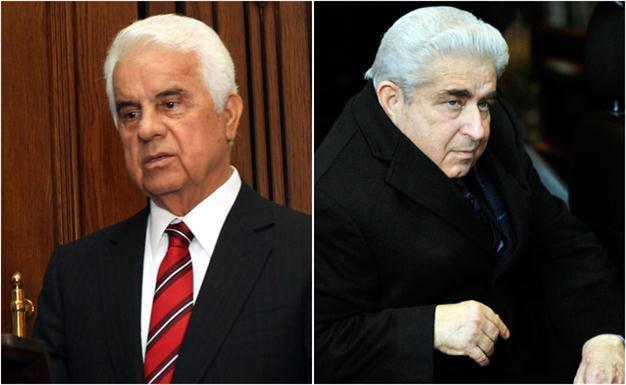Remarry or divorce scenario for Cyprus
ISTANBUL - Hürriyet Daily News

Turkish Cypriot President Derviş Eroğlu (L) and his Greek Cypriot counterpart Demetris Christophias. AA, AFP photos
What is left in our minds about the annual meeting of Turkish ambassadors who spent an entire week supposedly brainstorming ideas for 2012? We will mostly recall several ministers lecturing Turkish diplomats and the colorful views from their visit to Ankara.Actually, it seems they did find couple of hours to brainstorm; indeed their meeting on Cyprus was apparently quite a stormy one. How could it not be? If the prevailing view of the diplomats is endorsed by the government, 2012 will prove to be an extremely critical year not only for Cyprus but for Turkish-EU relations as well.
The general line to have come out of the meeting could be summarized as follows: “Turkish Cyprus is ready for remarriage but it is also ready for divorce. If Greek Cyprus does not want a one state solution then Turks are ready to negotiate a two state solution.”
Some however argued for a more radical approach, which will have serious consequences on Turkish accession talks, using Cyprus to engineer a brinkmanship scenario bringing Turkish-EU relations back from the brink of a train crash. The aim is to get the train back on track and moving.
Indeed, the Turkish train has slowed down so much it has nearly come to a standstill. The train that is accession talks cannot move forward unless there is a solution to the Cyprus problem. Solutions means concessions, but Greek Cypriots do not like the term, especially ahead of the presidential elections in 2013. As they are EU members, Greek Cypriots believe they can use Turkey’s membership bid to pressure for concessions in Cyprus talks.
Only heavy pressure from European powers backed by the United States can change Greek Cyprus’ current stance. Yet, French President Nicolas Sarkozy and German Chancellor Angela Merkel are extremely happy to see Cyprus blocking Turkish accession talks. In the current state of affairs, Cyprus talks are not going anywhere, with the detrimental consequence of bringing Turkey’s accession talks to a standstill.
“The EU is a mechanism that only moves forward in times of crisis,” a Turkish diplomat once told me. Why not use crisis diplomacy to get accession talks moving. The Turkish side could declare it will not return to the negotiation table if no solution is found until June 2012, when Greek Cypriots will assume EU’s presidency.
This message has actually been voiced for some time by Turkish Cypriots and EU officials, they have been warning both Turks and Turkish Cypriots to avoid this rhetoric. Indeed, it is no coincidence 11 EU foreign ministers published an article last month drawing attention to the importance of Turkey’s relations with Europe. Prime Minister Erdoğan’s statement last July stating talks cannot last forever, as well as recent signals coming from the island, probably prompted them to write the article.
“We are not bluffing. There is serious resentment. Nothing is moving forward in accession talks anyway. Nothing we will do can make Turkish-EU relations worse than they are today,” said a diplomat. “By the way, we will not say we will stop the accession process.” But refusing to come back to negotiating table on Cyprus will mean putting accession talks into the deep freeze.
Will an ultimatum on Cyprus prompt EU leaders to push for a breakthrough in inter-communal talks and consequently give fresh impetus to accession talks? Or will it make both Sarkozy and Merkel happier? Is Greek Cyprus ready to lose the only leverage it has on Turkey, the EU connection, and kiss goodbye to a lasting solution?
















